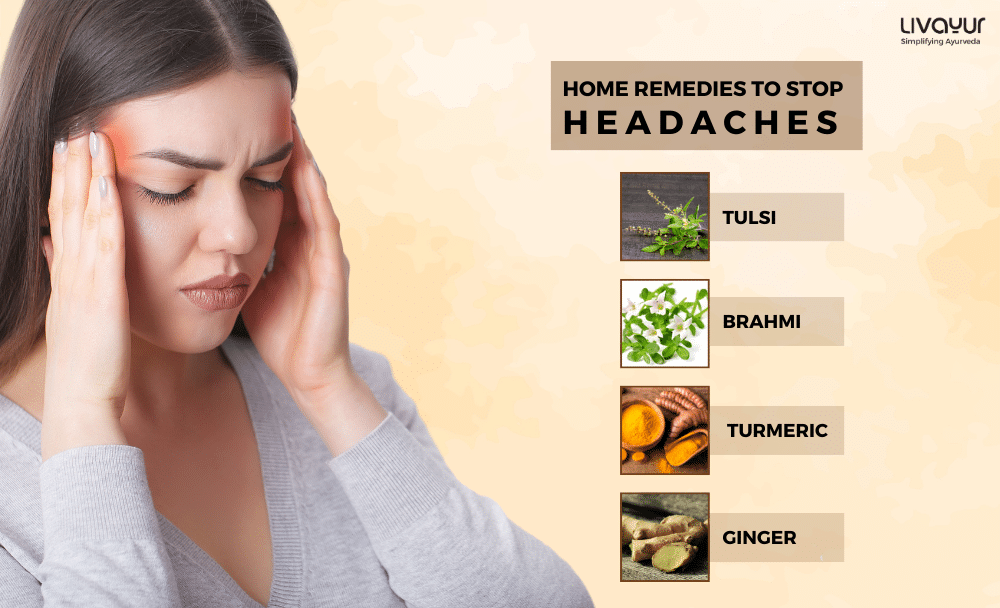This article is reviewed by experts.

Headaches may seem like a minor problem but they can severely impair quality of life by causing pain, reduced productivity, and disruption of daily activities. Over-the-counter medications can help with some types of headaches, but most only offer temporary relief and can pose a risk of other side effects. Moreover, headaches are a common problem that can surface frequently, making safe natural treatments preferable. To understand how to stop a headache immediately naturally, you should also try to understand the cause of your headache and what triggers headaches so that you can take steps to prevent headaches and use the appropriate remedies. Here is a complete list of suggestions on how to stop a headache immediately at home without medication.
How To Stop Headache Immediately At Home
- Ginger: Ginger is a spice that has anti-inflammatory and analgesic properties. It may help reduce the frequency and intensity of headaches, as well as relieve pain and nausea (5). Ginger can be consumed as fresh ginger root, ginger tea, or ginger supplements.
- Haldi: Haldi or turmeric is noted for its anti-inflammatory and antioxidant properties, making it popular as a remedy for coughs and colds. However, it may also help reduce headache pain by inhibiting the production of prostaglandins, which are chemicals that cause inflammation and pain (8). Turmeric can be used as a spice, a supplement, or a tea.
- Tulsi: Revered in Ayurveda for its spiritual and medicinal properties, Tulsi has antispasmodic and muscle-relaxant properties that can make it an effective antidote to headaches (7). It may help ease tension headaches by relaxing the muscles in the head and neck. Basil can be used as a spice, an essential oil, or a tea.
- Chamomile tea: Chamomile is a herb that has anti-inflammatory and anti-spasmodic properties. It may help soothe headaches by relaxing the nerves and muscles, reducing stress, and promoting sleep. Chamomile tea can be brewed from dried flowers or tea bags.
- Peppermint Oil: Peppermint oil is another essential oil that has a cooling and refreshing effect. It may help relieve headaches by stimulating blood flow, relaxing muscles, and reducing pain sensitivity. Peppermint oil can be inhaled through aromatherapy, applied topically to the temples or forehead, or massaged into the neck and shoulders (6).
- Lavender oil: Lavender oil is an essential oil that has a soothing and calming effect. It may help ease tension headaches and migraines by reducing stress and anxiety. Lavender oil can be inhaled through aromatherapy, applied topically to the temples or forehead, or added to a bath.
- Ashwagandha: This is another Ayurvedic herb that has a revitalizing effect on the body and mind. It can increase strength and energy, improve brain and nervous system functions, and lower stress levels (3). It also has anti-inflammatory properties that can help ease migraine pain. You can use Ashwagandha supplements or Ayurvedic medications that contain the herb to obtain quick relief.
- Brahmi: This is an ancient Ayurvedic herb that has a calming and soothing effect on the mind. It can lower stress, promote relaxation, strengthen memory and sleep, and also has anti-inflammatory and analgesic properties (2). It can prevent or treat migraines by relaxing the nerves and muscles, reducing inflammation, and inhibiting pain signals. You can use Brahmi oil or paste to massage your scalp or nostrils.
- Meditation: Mindfulness meditation can enhance well-being, lower stress and anxiety, prevent depression relapse and help with chronic pain, including chronic headaches. Mindfulness meditation does more than relax, also boosting attention, body awareness, emotion regulation, non-reactivity and meta-cognition. Some small studies have shown that mindfulness meditation may even improve migraine outcomes, quality of life and disability (9).
- Dietary Modification: Some people have trouble breaking down histamine, a chemical that causes allergic reactions. They may get headaches from eating foods high in histamine, such as cheese, beer, wine, and cured meats. Avoiding these foods may help them feel better (11). Histamine is also found in fermented foods and smoked fish.
- Hot Shower: This can help clear your nasal passages and relieve sinus headaches if your headache is related to a cold or sinus pressure (1). Such headaches tend to develop when there is congestion that increases pressure in the sinus cavities.
- Cold Compress: This can help reduce headache pain by decreasing inflammation, slowing nerve conduction, and constricting blood vessels (4). It may be especially helpful for headaches caused by heart medications containing nitrate. In such situations, however, it would also be a good idea to discuss alternative medications with your doctor.

13. Abhyanga: Abhyanga may be self-administered as this form of massage therapy to treat headaches. This practice may help alleviate headaches by easing muscle tension, improving blood flow, releasing endorphins and reducing stress.
14. Capsaicin: Capsaicin is a compound that gives chili peppers their heat. It may help ease headaches by desensitizing pain receptors and reducing inflammation. Capsaicin can be taken orally as a supplement or in spicy foods (10).
15. Magnesium: Magnesium is a mineral that is involved in many functions in the body, including nerve transmission and blood sugar regulation. Magnesium deficiency may be more common in people who get frequent migraines or chronic headaches. Taking magnesium supplements may help prevent or reduce such incidents by relaxing blood vessels and inhibiting pain signals in the brain (12).
Conclusion
Although home remedies for headaches can be extremely effective and will suffice in most cases, you should recognize that headaches may sometimes be indicative of a more serious underlying condition. This is particularly true if your headache develops after trauma or head injury, if there is a sudden onset of a severe headache, if accompanied by other neurological symptoms or if you already suffer from conditions such as high blood pressure. In such cases, seek prompt medical care as delays can increase the risk of life-threatening complications or mortality.
FAQs
What are some common causes or triggers of headaches?
Headaches can be caused or triggered by many factors, such as stress, lack of sleep, dehydration, hunger, hormonal changes, weather changes, noise, bright lights, strong smells, medications, food additives, alcohol, caffeine, or certain foods. You can identify your headache triggers by keeping a headache diary.
What are some foods or drinks that can prevent headaches?
Some foods or drinks that can prevent headaches include water, fruits, vegetables, nuts, seeds, and herbal teas. These foods or drinks may provide hydration, antioxidants, anti-inflammatory compounds, and other nutrients that can help prevent or reduce headaches.
What are some lifestyle changes that can help prevent or reduce headaches?
Some lifestyle changes that can help prevent or reduce headaches include getting enough sleep, avoiding stress, exercising regularly, quitting smoking, limiting alcohol intake, and avoiding headache triggers.
Disclaimer: The information provided here is for general information and not meant to substitute any medical advice. Please consult your doctor for appropriate medical consultation.
References:
- https://www.cmaj.ca/content/188/13/940
- https://www.ncbi.nlm.nih.gov/pmc/articles/PMC2915594/
- https://www.ncbi.nlm.nih.gov/pmc/articles/PMC3573577/
- https://www.ncbi.nlm.nih.gov/pmc/articles/PMC3727573/
- https://linkinghub.elsevier.com/retrieve/pii/S0735-6757(20)31039-1
- https://pubmed.ncbi.nlm.nih.gov/20456191/
- https://www.ncbi.nlm.nih.gov/pmc/articles/PMC9524226/
- https://www.ncbi.nlm.nih.gov/pmc/articles/PMC5674483/
- https://headachejournal.onlinelibrary.wiley.com/doi/abs/10.1111/head.12420
- https://www.ncbi.nlm.nih.gov/pmc/articles/PMC6273101/
- https://www.ncbi.nlm.nih.gov/pmc/articles/PMC8908729/
- https://www.ncbi.nlm.nih.gov/pmc/articles/PMC7551876/



















